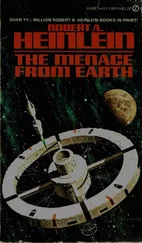“I sent the SOS signal.” He said. “Because for the past two weeks no one has come to relieve me. I suspect the entire population of the planet is afflicted with paralysis.”
“But why do you think that?”
“Because my own legs refuse to work.”
“Has this sickness afflicted you long?” I asked.
“No, not very.” The robot said. “In general, over the last few years, we’ve had jams even with lubricant, but in general we’ve managed to avoid them. But not long after one human had become angry with us and swore a terrible curse against us, a terrifying, mysterious paralysis began to ruin us, both the weak and the great. And I fear that I am the last more or less healthy robot on the entire planet. But the paralysis is already approaching my heart. And, as you see, even the jaw is affected.”
“All right, let me take a look. Maybe despite all your precautions you’ve forgotten to replace your oil properly.” Zeleny said with suspicion.
He went over to the robot and opened the round plate on the robot’s chest, put his hand inside, and the robot started to giggle.
“Ticklish!”
“Wait a moment.” The engineer insisted. He checked the joints in the robot’s legs and arms, straightened him out and said as he wiped his hands on a handkerchief:
“He’s been lubricated all right. I don’t understand it at all.”
“Nor do we.” The robot agreed.
We went on into the city. We stopped at one of the apartment buildings enormously long structures with long rows of single plank beds. The individual robots lay on their plants, covered with dust. Indicator lights burned on their foreheads; this meant the robots were alive. The robots could move their eyes, but nothing else. Finally, understanding nothing at all of what was going on, we returned to the space port terminal and put the robot dispatcher into the ATV. He was still at least able to talk. So we brought him to the Pegasus to analyze him there and try to determine the cause of the strange epidemic that had overwhelmed the planet.
The robot himself was able to help us with his own disassembly; he gave advice, which screw to turn, which button to press. The robot was neglected and dirty, but we were unable to find any particular damage to him. Although, in general, the service robots of this type had long ago been taken out of production in the Galaxy, they were designed to work for centuries and were capable of working in deep space, in volcanoes, underwater, or underground. They just had to be oiled from time to time, but they were perfectly capable of doing that themselves.
Finally, we laid out the parts of the robot on a large work table in the laboratory; we set his head up in one corner and tied it to the ship’s power net.
“Anything at all?” The head of the robot asked when Zeleny finished the mechanical dissection of his body.
Zeleny could only shrug his shoulders.
“Is there nothing that can be done?” The head asked quietly. “Our entire civilization will die.”
“We’ll have to send a message to Earth or to some other major planet.” I said. “They can send an expedition with specialists on robot sicknesses.”
“But how can we be sick?” The robot asked so firmly its jaw remained open. I had to go over and hit it under the chin.
“Thank you.” The robot said. “But should we remain like this our condition will be perilous. Think of yourself in our position. Not a single moving being on the entire planet. The very first rainstorm of flood will damage us irretrievably; we wouldn’t even be able to dry ourselves off.
“But listen,” I said, “There is no way we could stay with out until other help arrives!”
“Then your work must be extremely important, I take it?” The robot head asked.
Before I had a chance to answer Zeleny said:
“One last possibility. The first one. I’m going to try to change the oil. May I?”
“If it’s good quality oil, of course.” The robot head answered.
Zeleny began to clean all the moving parts of the robot and replace its lubricant with our own.
At the same time the robot asked again:
“And just what is it that you are doing?”
“We’re gathering animals for the Moscow Zoo.” I said. “Rare animals. We should even now be finishing the expedition and returning home. It is extremely difficult to carry a whole zoo with you.”
“If you can help us,” The robot said, “We would be delighted to give you our animals. There are none like them anywhere else in the universe.”
“What sort of animals?”
And then the robot told us:
Once, many years ago, an automated space ship crashed onto this planet; on board were a number of universal robots. They survived and built themselves huts from pieces of the ship. Then they found deposits of iron and other metals, they found uranium and many other useful resources, And then the robots began to build themselves children, and gradually, over the years, the robots, became very numerous.
But as intelligent as the robots were they were unable to look into the future. At that time there was water and air on the planet, grass and trees. The robots, however, had no interest whatsoever in the planet’s environment and ecosystems. They made use of their complete freedom and soon built many factories, and all the factories constructed robots, and the new robots built new factories and the new factories prepared new robots. And this continued until the day came when all the oxygen on the planet was consumed in the furnaces, all the trees were turned into warehouses for spare parts, all the native animals had died out, all the mountains were leveled to their foundations and all the seas were expended in coolant for engines. Finally the useful fossil fuels were used up. All that remained on the planet were robots, many billions of ordinary robots who suddenly had nothing at all to do.
The robots were the forced into a lottery; those who lost were taken apart for spare parts or sold to passing space ships or stellar wanderers for machine oil. That was how the robots lived. Gradually, they became all the fewer, but all the same there remained many millions of robots unemployed. The robots decided to build a space ship and fly it to some as yet unsettled planet in order to start all over again, but they were unable to build a ship because they had no plans, and they were unable to design one themselves. And so it continued, right up to the present time. And then this strange epidemic struck the robots and all of them were paralyzed.
“But about what animals are you talking?” I asked the robot’s head.
“About robot animals. We wanted to have everything that people have. And when we realized that the local animals had all died out because they could not live on a dead planet, we made artificial animals But then the shortages became to great and we decided to turn the animals into spare parts of ourselves. We don’t do it any longer, but the animals could feel the danger and they fled over the planet Eyeron’s flat valleys. If you can help us we can catch some totally unusual metal animals for you.
“Thank you,” I told the robot head, but at the same time thinking that such animals would hardly fit into our Zoo when every school child on Earth can now build a mechanical turtle or electric hedgehog from a kit bought from a store.
While we spoke with the robot’s head Zeleny cleaned all the parts of the robot’s body throughly and applied new lubricating oil. Then he tightened the robots screws from top to bottom and pressed his thumb down on a red button. All of us waited with concern for what might happen next. The robot uncertainly raised an arm and then made a step forward. The leg obeyed him He made another step, raised both arms above his head, bent forward, then back, and began to dance. I had never before in my life seen a dancing robot. He almost knocked over the table and nearly kicked me; the robot seemed to be laughing from joy.
Читать дальше












